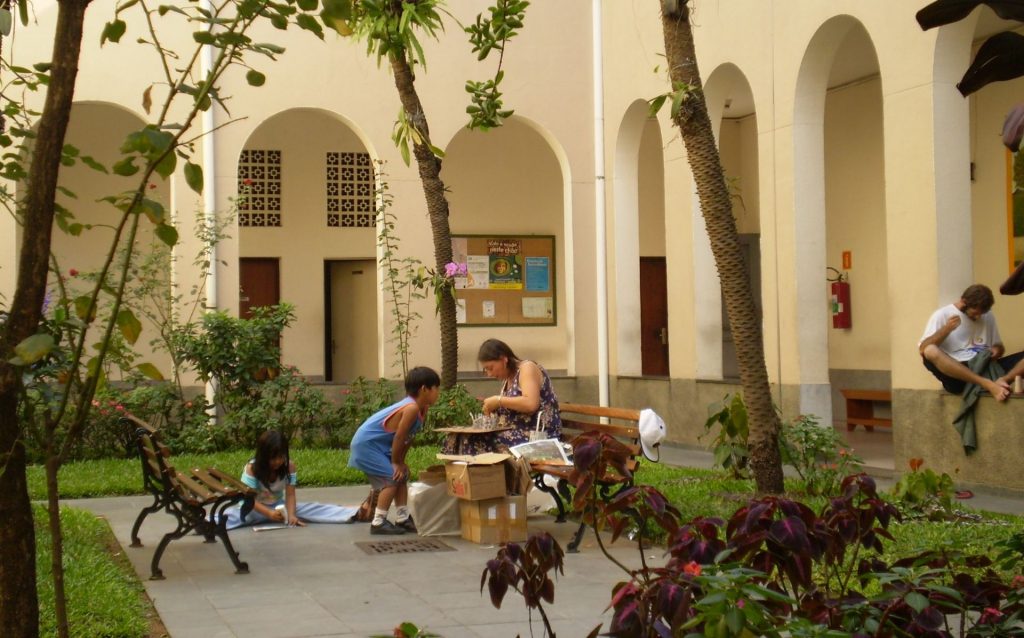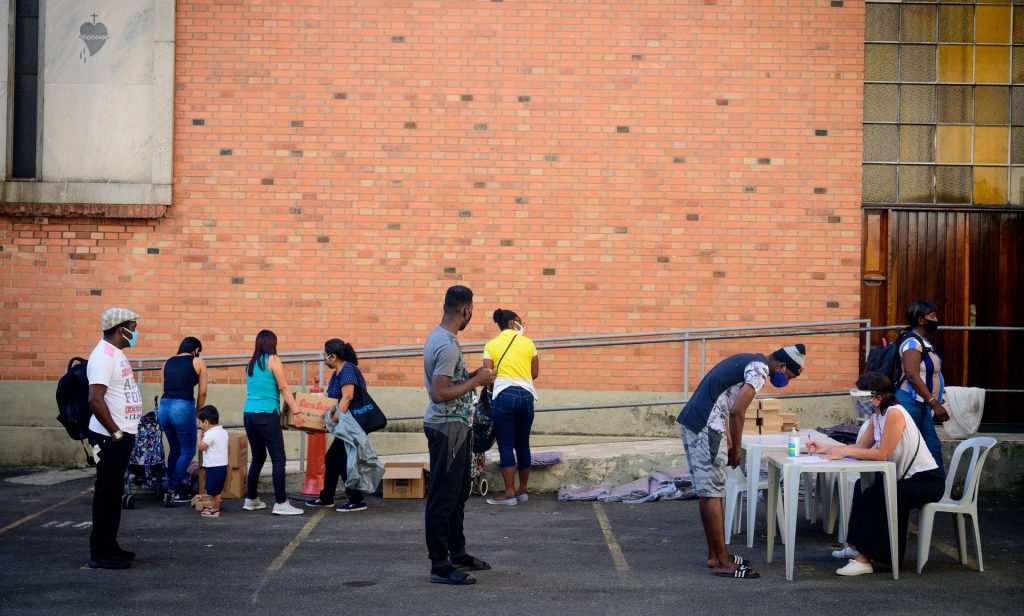By Paolo Parise and Clarissa Paiva.
Missão Paz (Peace Mission) is a philanthropic institution that has supported and welcomed migrants and refugees arriving in São Paulo, Brazil, since 1940. The institution belongs to the Missionaries of São Carlos (Scalabrinians) and is a member of the Scalabrinian International Migration Network, which operates in 32 different countries.
The main objective of the institution is to welcome migrants by understanding their stories, respecting their identities and promoting their integration into their new social context. Missão Paz fights for the human rights of individuals and groups in vulnerable situations (due to their mobility processes), regardless of their gender, belief, class, ethnicity and national origin.
The Institution is composed of the Casa do Migrante (Migrant House), Centro Pastoral e de Mediação dos Migrantes (Pastoral and Mediation Centre for Migrants), Advocacy, Communication, Memory and Documentation Centre, Radio WebMigrantes, Project Management, and Centre for Migration Studies (CEM).

The Casa do Migrante is the shelter of Missão Paz and can accommodate up to 110 migrants who find themselves homeless. It offers food, clothes, personal hygiene kits and Portuguese language classes as well as social and psychological support from social workers and psychologists. The house has a TV room, library, playroom and laundry for collective use by the residents.
The Pastoral and Mediation Centre is the axis of specialised support and services for migrants. Itis structured through the following themes: documentation and legal support; insertion for work in Brazil, training and citizenship; health; social service; and family and community.
The Centre for Migration Studies (CEM) has a library specializing in human mobility material for studies about migration and refugee status. It also edits and publishes the Journal Travessia (founded in 1988), offers online courses, organises seminars with national and international partner universities, organises the ‘CEM Dialogues’ with specialists, intellectuals and activists of migration, and supports the training of students and researchers interested in the theme of migration. In addition, the centre has a collection of documents regarding its own history, especially related to the 1970s when Missão Paz worked closely with the largest social mobilisations in Brazilian history for democracy.
CEM is also part of the international network of Scalabrinian study centres, which can be found in Paris, Rome, São Paulo, Buenos Aires, New York, Cape Town and Manila. Each centre is dedicated to researching the social, religious, economic and political dynamics within a ‘cosmic solidarity’.
Through the combination of research and activism – such as publication and dissemination of research findings, and lobbying and advocacy for the protection of migrants and their families – CEM also provides training for pastoral agents and leaders of civil society groups. Together with the Migrant House and the Pastoral and Mediation Centre for Migrants, CEM organises, records and archives the data on migrants who receive care from Missão Paz, always respecting their human dignity and protecting their personal data.
Missão Paz and the reception of migrants and refugees during the COVID-19 pandemic
The consequences of the COVID-19 pandemic, such as border closures and health and economic crises, have caused a clear decrease in migrants and refugees arriving in Brazil in general and in São Paulo in particular. Vulnerable migrants and refugees who were already in the country, however, have increasingly had to seek support. Self-employed and micro-entrepreneurs were left without income; informal workers were left with no means to survive; formal workers had their salaries reduced; and migrants without the proper documents were unable to obtain emergency aid from the Brazilian Federal Government. During this period, Missão Paz has done what it can to help these individuals survive.

Our first step was to disseminate safe and reliable information about the pandemic and places people could turn to for support. We used radio, social media, our website and multilingual newsletters to explain to people how they can prevent contamination. As the situation worsened, services at our physical sites were suspended with the exception of distributing food baskets and other items of basic utility. The priests at Missão Paz, together with some employees and volunteers, handed out food baskets, nappy packs, powdered milk, personal hygiene kits, environmental hygiene boxes, clothes, blankets and masks.
Psychological, legal and social services were provided by mobile phone or e-mail. Migrants have to use an online portal to gain access to the Brazilian government’s emergency benefit system, but language difficulties along with a general unfamiliarity with Brazil’s bureaucratic systems make this unfeasible for many migrants. Without the support of social workers like ours they would, most likely, have remained excluded from governmental aid.
Our records show that we have served migrants and refugees of 72 nationalities during this pandemic. Haitians, Venezuelans, Bolivians, Paraguayans, Angolans, Congolese and Peruvians were the most common nationalities. Interesting too has been the shifting gender breakdown of those accessing our services. Between March and September 2020, it was nearly an even split between men and women, however in the same period a year earlier more than 60% were men. In other words, it is evident that during the pandemic the number of women who looked for help at Missão Paz increased.
Overall, being unable to access the emergency benefit from the Brazilian government, decreasing income, unemployment, difficulty in paying rent, and living and working conditions that exposed them to COVID infection all accentuated the vulnerability experienced by these migrants and refugees. Women and girls are invariably vulnerable when they migrate, especially Black and Indigenous women whose bodies tend to be overlooked as invisible. It is urgent, then, that they not only become visible but can also speak out. We need to consider their life stories, origins and families to appreciate their individual hardships and experiences. For these women to demand consideration and respect is not just an act of courage but also one of rights and justice. It is a political stance that is necessary for society to change.

